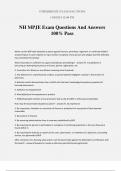©THEBRIGHT EXAM SOLUTIONS
11/8/2024 12:08 PM
NH MPJE Exam Questions And Answers
100% Pass
When can the BOP take disciplinary action against licensee, permittee, registrant, or certificate holder? -
answer✔Upon its own initiative or Upon written complaint of any person who alleges that the defendee
has committed misconduct
What misconduct is sufficient to support disciplinary proceedings? - answer✔1. Fraud/deceit in
procuring or attempting to procure a license, permit, registration, etc
2. Conviction of a felony or any offense involving moral turpitude
3. Any dishonest or unprofessional conduct, or gross/repeated negligent conduct in the practice of
pharmacy
4. Behavior which demonstrates clear conflict with the basic knowledge/competency expected of
licensed pharmacists
5. Addiction to drugs/alcohol
6. Mental/physical incompetency to practice
7. Willful/repeated violation of any provisions laid out by the BOP or other governing bodies
How may the board take disciplinary action? - answer✔1. By reprimand
2. By suspension, limitation or restriction of license or probation for any period of time deemed
reasonable
3. Revocation of licesnse
4. By assessing administrative fines in amounts established by BOP
5. By requiring the person to participate in a program of continuing education in the area they were
found deficit in
6. By requiring the licensee to submit to the care, observation, or treatment of a physician, counseling
service, etc approved by BOP
After conclusion of a hearing, what actions can the board take against the defendent's certification with
the board? - answer✔Suspend or revoke a pharmacy permit/license/registration
, ©THEBRIGHT EXAM SOLUTIONS
11/8/2024 12:08 PM
On what grounds can the board suspend/revoke a pharmacies permit/license/registration (The actual
pharmacy itself)? - answer✔1. Suspension, revocation, or expiration of a pharmacist license of the PIC
2. Termination of the employment of the PIC @ the pharmacy
3. Operation of the pharmacy is in violation of federal, state or local laws/rules/regulations
4. Unsanitary conditions
5. Fraud, intentional misrepresentation or perjury in securing the permit/license/registration or in any
hearing before the board
6. Unprofessional conduct (includes violations of laws/rules/regulations, acts of omissions which the
board believes poses a threat to the safety of the public)
What is compounding - answer✔Prep, mixing, assembling, packaging or labeling of a drug/device as a
result of practitioner's order or for like office use. Does not include reconstitution of powdered
formulations or adding flavoring
FPGEC - answer✔Foregn pharmacy graduate equivalency committee administered by NABP
FPGEE - answer✔Foreign pharmacy graduate equivalency examination administered by NABP
Prescription device (or legend device) is? - answer✔An instrument, apparatus, implement, machine,
contrivance, implant or other similar/related article (includes any component part or accessory), which
is restricted for distribution and use only upon the order of a licensed practitioner
A drug, which under federal law is required, prior to being dispensed/delivered, must be labeled with
the following statements (any of them): - answer✔"Caution federal law prohibits dispensing without a
prescription," or "Caution federal law restricts this drug to use by or on the order of the licensed
veterinarian," or Rx only
Automated pharmacy system - answer✔Mechanical systems that perform operations or activities such
as storage, packaging, dispensing and distribution of meds while it collects, controls and maintains all
transaction information
What is a collaborative pharmacy practice (general description) - answer✔Practice of pharmacy
whereby one or more pharmacist jointly agree (on a voluntary basis) to work in conjunction with one or
more attending practitioners under a written protocol
What can a pharmacist do with a written protocol in a collaborative pharmacy practice agreement? -
answer✔pharmacist may perform MTM authorized by attending practitioner/s under certain specified
conditions and limitations
What is MTM? - answer✔A review of medication therapy regimens for the purpose of
evaluating/rendering advice to a practitioner
, ©THEBRIGHT EXAM SOLUTIONS
11/8/2024 12:08 PM
Evaluating and modifying medication regimen in accordance with the collaborative pharmacy practice
agreement.
The decisions are based on the best interest of the patient
Actions of a pharmacist in MTM are limited to: - answer✔1. Implementing/modifying/managing
medication therapy according to the collaborative practice agreement
2. collecting/reviewing patient history when relevant
3. obtaining/checking vitals (pulse, temp, BP, RR, etc.)
4. ordering lab tests specifically set out by the collaborative practice agreement or protocol-driven
5. formulating a medication treatment plan that will be shared with the practitioner
6. monitoring/evaluating the patient's response to therapy
7. performing comprehensive medication review in conjunction with the doctor to
identify/resolve/prevent medication-related problems
8. documenting care given and communicated to the patient's doctor
9. providing education/training designed to enhance patient's understanding and appropriate use of
their medication
What is a reverse distributor? - answer✔Those who facilitates the removal, disposal, or destruction of
prescription drugs
What is an outsourcing facility? - answer✔Engaged in compounding of sterile drugs
What is the make up of the board of pharmacy? - answer✔7 members: 6 practicing pharmacists and 1
public member appointed by the governor that includes 1 full-time hospital pharmacist and 1 public
member with no ties to pharmacy
What are the requirements for the pharmacists on the board? - answer✔Must have been a licensed
pharmacist for at least 10 years, and practiced in NH for 5 years. May serve only 2 consecutive term
limits (10 years)
Board members pay - answer✔$100 a day and their necessary expenses while engaged in their duties
What are the secretary's duties for the board? - answer✔Keep a record of meetings
Conduct its correspondence
record on file of licensure of pharmacists in the state
Outside of pharmacies, who can the board inspect and regulate in relation to the use of prescription
drugs? - answer✔All physicians, vets, dentists, nurse practitioners, PAs, clinics under contract with




